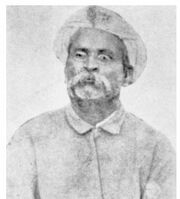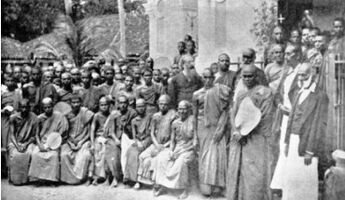416
THE THEOSOPHISTS AT MALIGAWA
[The Ceylon Times, June 30, 1880.][1]
Sir,—May I hope to be allowed the same number of lines in the columns of your valuable paper, for the refutation of a mis-statement—misled no doubt by an untruthful correspondent—you have devoted to the affirmation of the same? The paragraph published in your issue of June 22, under the title of “The Theosophists at Maligawa,” must have been originally intended for the columns of the Observer, where experience has warned us to expect neither decency nor impartiality, and we are surprised at nothing But to find in a respectable paper like the Times an odiously malicious reflection upon myself [is] quite another affair. I appeal to you as a gentleman to remove the wrong impression made by it upon the public mind.
Colonel Olcott lost nothing at the Dalada Maligawa, neither “rosette” nor anything else. In the surging crowd a hand suddenly snatched from the breast of Mr. Padshah, one of the Parsee gentlemen accompanying us, the silver and gold badge of the Theosophical Society. It was so quick that he could not distinguish the hand, and as the object was worth not above a few rupees, his first thought shared subsequently by all of us was that it was an act of pure malice. This suspicion was in a measure warranted by the disgraceful behaviour of the native Christian party on the preceding evening at the Town Hall, where Colonel Olcott lectured to an audience which we believed was to have been composed only of gentlemen. (Parenthetically I will now notice one of the twenty-three fibs of the Observer.


417
Not only was the lecturer on that occasion not asked why he had “for the last hour been abusing Christianity,” but—as the printed lecture will show—he had not even so much as mentioned either Christianity or Christians. Nevertheless, at the close of the evening’s proceedings a clique of these obstreperous zealots made such a row, and hissed so, that the indignation of even the European Christian gentlemen present, including a high official, was provoked, and they came forward and apologized to us.) So, when I heard the episode of the badge, I most certainly regarded it as an insult offered by either some native Christian convert or Burgher, and I said so. But I neither addressed myself to the Dewa Nilame nor were we near the relic. I had the arm of Mr. Wimbridge and was leaving the temple by the main entrance when we met the European Manager of the European Kandy Club, and told him the story. There were some young Englishmen standing by; but to say that I even indirectly indicated either of them as the culprit, is simply falsehood. Should they read these lines, I appeal to their sense of honour and justice to corroborate me.
The fact is, that from the moment we set foot on the Island of Ceylon—six weeks ago—we have been preached against by the Missionaries and attacked by their organs, with the Observer at their head. They have shrunk from neither calumny, falsehood, slander, nor vile innuendo; not once has either of these journals given a truthful account of what we have done or said. And so, as regards the Maligawa story, in the concluding words of the Times’ paragraph which I so emphatically protest against—“the motive is not difficult to guess.”
Galle, June 25.
Footnotes
- ↑ [Transcribed from H. P. B.’s Scrapbook, Vol. IV, P. 100, by courtesy of The Theosophical Society, Adyar.—Compiler.]